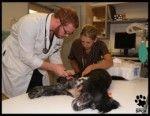The Houston Society for the Prevention of Cruelty to Animals (SPCA) and the Texas A&M College of Veterinary Medicine and Biomedical Sciences have formed what Kenita Rogers, the college’s associate dean for the professional programs, said is the largest partnership between an animal shelter and a veterinary program in the country.
A&M veterinary students are required to participate in a two-week rotation at the Houston SPCA as part of the core curriculum for fourth-year veterinary students. In the first three years of study, students focus on course work. In the fourth year, they complete various core and elective rotations. Rogers said the college believed the rotation program was an important opportunity that all students should experience.
“We believe in it so much that we made that two-week rotation required,” Rogers said. “We believe it’s a really great experience because of the animal caseload and the breadth of experiences, we believe all students ought to have the opportunity to learn from.”
Rogers said the program is unique in that it offers students exposure to not only a high volume of cases, but a wide variety of species. She said the shelter serves approximately 1,000 animals each day, from household pets to large animals, native wildlife and exotics.
“When you think about being in a situation where there are 1,000 animals on any given day being cared for, that sort of put it in perspective for me,” Rogers said. “Not only how big their task is and how large their mission is, but also how many opportunities there are for our students to learn.”
The concept of shelter medicine is different from a standard veterinary clinic, Meera Nandlal, the Houston SPCA public relations manager said. The wide variety of species and issues experienced can create a fast-paced and diverse-care environment, she said.
“[The students] are getting a huge overview of a wide variety of animals in a two-week period, and every day there’s something different going on, hour after hour, minute after minute,” she said. “They’re getting quite a bit of exposure in a very short about amount of time.”
First-year veterinary medicine student, Beverly Finneburgh, said she is excited about participating in the program as a part of her curriculum. The exposure to a diverse set of animals will help give her and other students experience outside of their area of concentration.
“It can be easy as a student to become too focused on your interest, whether it be small animals or exotics, and a rotation at the SPCA forces you to work on whatever walks through the door,” Finneburgh said.
With the vast number of individual animals serviced each year, practicing shelter medicine will also give students experience in population medicine, as opposed to just individual medicine, Rogers said. Vaccinations and contagious diseases become even more of a concern within a shelter.
The program will also allow students to ride along with a Houston SPCA animal cruelty investigator and attend court proceedings regarding animal welfare. Finneburgh said exposure to the realities of animal abuse and abandonment will provide veterinary students with valuable information.
“The up-close views on animal cruelty, while tragic, will better prepare students to deal with such cruelty in their own practice, whether it be in a clinic or another setting,” Finneburgh said. “It can be hard to identify and address cruelty for a practicing veterinarian, and I think being exposed to it as a student under the care of another veterinarian will be a huge benefit.”
Rogers said the program also provides a great opportunity for the Houston SPCA to expose students to issues concerning animal welfare such as vaccinations, population control and abuse.
“I think they see it as a way to help shape new veterinarians for the future, to make sure they understand the issues out there with this portion of animal welfare and make sure that they’re helping us train a group of veterinarians that’s prepared to help deal with some of these societal issues,” Rogers said.
The benefits of this program will be long-lasting, as the experiences gained through the Houston SPCA will greatly emphasize the idea of giving back to the community, said Eleanor Green, the Carl B. King dean of veterinary medicine and biomedical sciences.
“We have a very student-centered culture here in our college and the veterinary school and this is another example of that,” Green said. “This is about not only what is good for students and how we can best prepare them, but in doing so in a way that serves Texas and Texans.”
Vet Med partners with animal shelter
July 24, 2013

Donate to The Battalion
Your donation will support the student journalists of Texas A&M University - College Station. Your contribution will allow us to purchase equipment and cover our annual website hosting costs.



















